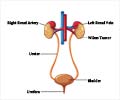A combination of two immunotherapy drugs, ipilimumab and nivolumab has been approved by FDA to improve treatment of metastatic kidney cancer. Clinical trials showed higher response rate and improved survival in kidney cancer patients.

‘A combination of two immunotherapy drugs, ipilimumab and nivolumab, has been approved by FDA to improve treatment of metastatic kidney cancer after clinical trials showed higher response rate and improved survival in kidney cancer patients.’





The study, which is sponsored by Bristol-Myers Squibb and co-led by Drs. Hans Hammers, Bernard Escudier, Pamela Sharma and Robert Motzer, reported that the combination of nivolumab and ipilimumab led to a 37 percent improvement in survival compared with sunitinib. The immunotherapy combination led to durable responses in 42 percent of patients, and 9 percent of these patients experienced complete disappearance of their tumors."The approval of this combination immunotherapy is the most significant advance for the treatment of kidney cancer over the last 10 years. Not only is this therapy superior than the current the standard of care, but patients experienced also a better quality of life," said Dr. Hans Hammers, Associate Professor of Internal Medicine and Co-Leader of the Kidney Cancer Program at UT Southwestern. "However, serious side effects can occur which require timely diagnosis and expertise in their management."
The findings resulted from CheckMate-214, an international, randomized phase three trial that evaluated 1,096 patients with advanced or metastatic kidney cancer of clear cell type, the most common type. The combination group received nivolumab 3 mg/kg plus ipilimumab 1 mg/kg every three weeks for four doses followed by nivolumab 3 mg/kg every two weeks. Patients in the comparator group received sunitinib at standard doses.
"This is a significant step forward toward the ultimate goal of achieving a cure for our patients," said Dr. James Brugarolas, Professor of Internal Medicine and Leader of the Kidney Cancer Program at UT Southwestern's Simmons Cancer Center. "Importantly, the immunotherapy combination helps a group of patients with aggressive kidney cancer, who had only derived marginal benefit from other available treatments."
Combination immunotherapy with nivolumab and ipilimumab is already FDA-approved for the treatment of melanoma and is being tested in other cancers. Nivolumab and ipilimumab are being combined with stereotactic radiation to further boost their activity in a clinical trial for patients with kidney cancer at UT Southwestern's Kidney Cancer Program, which offers the broadest platform of radiation options for kidney cancer patients. Ongoing efforts by Dr. Bruce Beutler, who received the Nobel Prize in 2011 for his work on the immune system, and others at UT Southwestern aim to develop novel immunotherapies.
Advertisement
Source-Eurekalert















